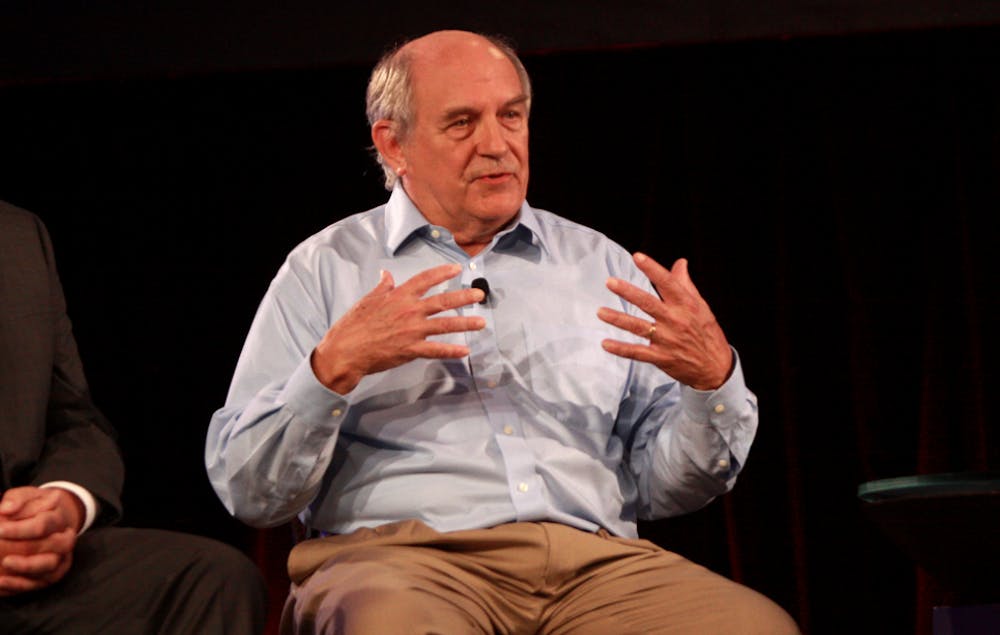Duke will be taking extra precautions Tuesday night when controversial social scientist Charles Murray comes to speak.
Murray, whose critics label him a eugenist, argued in his 1994 book “The Bell Curve: Intelligence and Class Structure in American Life” that differences in intelligence between white Americans and black Americans could be related to a combination of environment and genetics. Earlier this month, protesters at Middlebury College made national headlines when they violently interrupted Murray’s speech and descended in an angry mob on him and the Middlebury professor interviewing him.
Following the protests at Middlebury, Duke students involved in the American Enterprise Institute—a conservative think-tank based in Washington, D.C.—approached the University and asked if Murray could come to Duke.
“We had no reservations whatsoever,” said Larry Moneta, vice president for student affairs. “He’s been here before, on multiple occasions. We’ve had controversial speakers many times in the past. But that doesn’t mean we aren’t aware of what happened at Middlebury. We are taking appropriate precautions.”
Moneta said those precautions included holding the event in a secure location and requiring tickets for attendees. The event, which will begin at 6 p.m. in the Doris Duke Center, is co-hosted by the Duke College Republicans.
Duke staff and police will also be present, Moneta said.
In the talk, Murray is scheduled to speak about his 2012 book “Coming Apart,” which examines the white working class. The event’s Facebook page notes that Murray will discuss how the book “traces some of the social trends that help explain the 2016 election.”
The last time Murray came to campus—in October 2013—students staged a walk-out of the event, which was similarly sponsored by the AEI. The walkout was initiated by an opinion column published in The Chronicle by then-senior Prashanth Kamalakanthan, who encouraged students to leave the talk because of Murray’s controversial publications on wealth and intelligence in America.
President Richard Brodhead said that he followed “every bit” of the events at Middlebury, where Laurie Patton—the former dean of Trinity College of Arts and Sciences—is now president.
Brodhead said he believed Patton did “a great job” of handling the incident, although he acknowledged she was likely disappointed in how it played out.
In a letter to the Middlebury community following the protests, Patton wrote that Middlebury “must find a path to establishing a climate of open discourse as a core Middlebury value, while also recognizing critical matters of race, inclusion, class, sexual and gender identity, and the other factors that too often divide us.”
During an interview before Duke’s AEI club announced Murray would speak on campus, Brodhead promoted in general terms the value of free speech at universities.
“If universities don’t stand up for the idea that nobody knows the whole truth yet and the only way we learn more of it is through exchange across lines of difference of opinion—if universities don’t stand up for that, who in the world is going to?” he asked.
Brodhead said he remembered that when he was a student at Yale University—where he attended college and received his Ph.D. in 1972—General William Westmoreland, who commanded U.S. troops during the Vietnam War, was repeatedly invited to speak on campus.
But Brodhead, who described the 1970s as a period “of sort of militant righteousness about social issues,” said that once Westmoreland took the stage, protesters would “boo and hiss and eventually he would go away.”
“I actually am not an admirer of General Westmoreland, but having him come and speak doesn’t say you admire him, it says that you uphold as a general principle that if people can shut down points of view they don’t agree with, then you’re going to have a world where the possibilities for education are radically limited,” Brodhead said.
Get The Chronicle straight to your inbox
Signup for our weekly newsletter. Cancel at any time.

